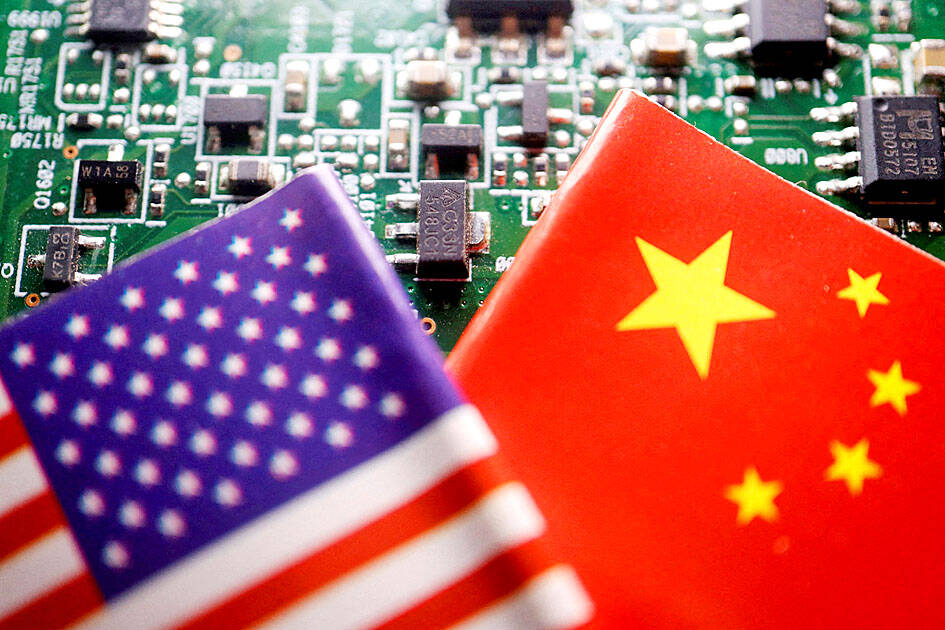US President Joe Biden’s administration is considering further restrictions on China’s access to chip technology used for artificial intelligence (AI), targeting new hardware that is only now making its way into the market, people familiar with the matter said.
The measures being discussed would limit China’s ability to use a cutting-edge chip architecture known as gate all-around (GAA), which is supposed to make semiconductors more powerful and is currently being introduced by chipmakers, the people said.
It is unclear when officials would make a final decision, the people said, adding that they are still determining the scope of a potential rule.

Photo: Reuters
The US’ goal is to make it harder for China to assemble the sophisticated computing systems needed to build and operate AI models, and to cordon off still-nascent technology before it is commercialized, they said.
Companies such as Nvidia Corp, Intel Corp and Advanced Micro Devices Inc — along with manufacturing partners Taiwan Semiconductor Manufacturing Co (台積電) and Samsung Electronics Co — are looking to start mass-producing semiconductors with the GAA design within the next year.
A spokesperson for the US Department of Commerce’s Bureau of Industry and Security, which oversees export controls, declined to comment.
The bureau recently sent a draft GAA rule to what is known as a technical advisory committee, some of the people said.
The panel is composed of industry experts and offers advice on specific technical parameters — a final step in the regulatory process.
However, the rule is not yet finalized, after industry officials criticized the first version as overly broad, the people said.
One person familiar with the matter said the measures would not go as far as an outright ban on GAA chip exports, but instead focus on the technology needed to make them.
There are also early-stage discussions about limiting exports of high-bandwidth memory (HBM) chips, some of the people said.
HBM semiconductors, made by SK Hynix Inc, Micron Technology Inc and others, speed up access to memory, helping bolster AI accelerators. They are used to train AI software — a process that involves bombarding models with information.
It is unclear whether a rule on HBM chips could come together, the people said, adding that the GAA conversation is further along.

MULTIFACETED: A task force has analyzed possible scenarios and created responses to assist domestic industries in dealing with US tariffs, the economics minister said The Executive Yuan is tomorrow to announce countermeasures to US President Donald Trump’s planned reciprocal tariffs, although the details of the plan would not be made public until Monday next week, Minister of Economic Affairs J.W. Kuo (郭智輝) said yesterday. The Cabinet established an economic and trade task force in November last year to deal with US trade and tariff related issues, Kuo told reporters outside the legislature in Taipei. The task force has been analyzing and evaluating all kinds of scenarios to identify suitable responses and determine how best to assist domestic industries in managing the effects of Trump’s tariffs, he

TIGHT-LIPPED: UMC said it had no merger plans at the moment, after Nikkei Asia reported that the firm and GlobalFoundries were considering restarting merger talks United Microelectronics Corp (UMC, 聯電), the world’s No. 4 contract chipmaker, yesterday launched a new US$5 billion 12-inch chip factory in Singapore as part of its latest effort to diversify its manufacturing footprint amid growing geopolitical risks. The new factory, adjacent to UMC’s existing Singapore fab in the Pasir Res Wafer Fab Park, is scheduled to enter volume production next year, utilizing mature 22-nanometer and 28-nanometer process technologies, UMC said in a statement. The company plans to invest US$5 billion during the first phase of the new fab, which would have an installed capacity of 30,000 12-inch wafers per month, it said. The

Taiwan’s official purchasing managers’ index (PMI) last month rose 0.2 percentage points to 54.2, in a second consecutive month of expansion, thanks to front-loading demand intended to avoid potential US tariff hikes, the Chung-Hua Institution for Economic Research (CIER, 中華經濟研究院) said yesterday. While short-term demand appeared robust, uncertainties rose due to US President Donald Trump’s unpredictable trade policy, CIER president Lien Hsien-ming (連賢明) told a news conference in Taipei. Taiwan’s economy this year would be characterized by high-level fluctuations and the volatility would be wilder than most expect, Lien said Demand for electronics, particularly semiconductors, continues to benefit from US technology giants’ effort

‘SWASTICAR’: Tesla CEO Elon Musk’s close association with Donald Trump has prompted opponents to brand him a ‘Nazi’ and resulted in a dramatic drop in sales Demonstrators descended on Tesla Inc dealerships across the US, and in Europe and Canada on Saturday to protest company chief Elon Musk, who has amassed extraordinary power as a top adviser to US President Donald Trump. Waving signs with messages such as “Musk is stealing our money” and “Reclaim our country,” the protests largely took place peacefully following fiery episodes of vandalism on Tesla vehicles, dealerships and other facilities in recent weeks that US officials have denounced as terrorism. Hundreds rallied on Saturday outside the Tesla dealership in Manhattan. Some blasted Musk, the world’s richest man, while others demanded the shuttering of his